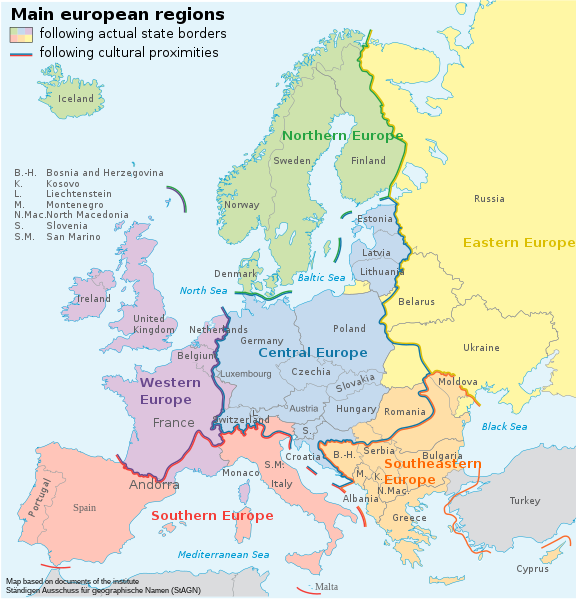Well, I realize the futility of attempting a discussion on this topic with all the usual thread-killers present, but well, I need to procrastinate with
something...
Well, Eastern European countries often have a set of common political cultures and geographical characteristics that set it apart from Western Europe:
All the three you mentioned are by-products of the 40-year long period of their Communist past. Moreover, they're not even factually correct, as I will show below. I'd just remind people that 40 years is *nothing* in terms of the overall history of the countries now branded "eastern Europe"—why should these 40 years continue to define them, even when Communism is long gone?
1) They did not receive immigration from Muslim countries and developing countries since these countries did not compete in international markets to the same extent the West did in the 1960s and 1970s. Immigration thus plays a marginal role in Eastern European politics.
And what's important here - the immigration itself, or the minority issues it creates?
Western European countries, let's call them the "old West" for the sake of humour, face their issues with Muslim minorities; Central Europeans have issues with their minorities (the Roma). Both suck at solving these problems.
As for immigration, the experience is building up. Right now, Czechia has a net (im)
migration rate higher than Germany and Finland, and in bears comparison to countries like Belgium or Switzerland. It is very likely that in the next 25 years, Central Europe will become major recipient of immigrants, especially from Europe's eastern fringes.
And speaking as a Czech, pretty much every school class in Prague and Brno these days include kids belonging to visible minorities, usually the Vietnamese or children of foreigners living in this country. The days when you could walk around Brno for weeks without seeing a single non-white face are long, long gone.
2) Due to the trauma's associated with government planning and the Communist era, there is a consensus towards economic libertarianism, left-and-right, as well as Pro-American outlook in foreign policy.
You've clearly never been to the Czech Republic, which probably ranks among the most socialist in Europe

What I mean to say here is hard to prove (but I invite you to Google GINI coefficients and other markers of neoliberal economic policies), but the "knee-jerk" reaction to Communism—the turning to the neoliberal economic dogma— the old Westerners sometimes imagine simply does not exist; definitely not as a defining trait.
I'd say it is the other way round: the communist era instilled in the culture a sort of communitarian outlook and a strong dedication to equality (and equally strong disgust of the political elites who mismanaged it all), including gender equality. Countries like Czechia now have one of the lowest poverty rates and lowest income inequality as well as very good access to basic services. In this they are often much closer to Scandinavia or the old West part of continental Europe than to the supposedly economically liberal economies of the anglo-saxon world.
As you can see, new EU member states are there on both ends of the spectrum
As for the pro-American outlook, this also differers from country to country. In Czechia, the public is mostly America-sceptic and opposes too much American presence, especially military. Poland is different, as well as the Baltics; but one has to appreciate why—the threats to their security are much higher and the US is seen as the best bet to boost their chances for long-term safety and security.
BUT, Poland and other Central European countries (perhaps with the exception of Czechia now) are firmly pro-European as well, so the notion of Rumsfeldian "New Europe" sticking with America against the "Old Europe" has absolutely not materialized.
One common feature among Central European countries is their strong tendency to reject totalitarianism and authoritarian rule, because those are associated with their unfree past. Where the old Western countries may be more lukewarm on stressing the values of political liberty, Central European politicians will accentuate them, especially when speaking about countries they deem culturally related, i.e. Russia, Belarus, Ukraine.
3) They are more anti-Russian than Western European countries, Russia being culturally European, but geopolitically Asian. They are more or less sandwiched between Russia one hand, and Germany, Italy and France, who seek rapproachement with Russia, relying on Russian gas, and Russia relying more on them for its profits.
And right now, the old West Europe is starting to notice, with a great deal of unease, that those "anti-Russian" "easterners" may have been right about Putin all along.
But again, this stereotype has holes in it. Some old West European countries are also pretty Russia-sceptic (Sweden to name just one) and some Central European countries are rather open to Russia at times (Hungary and at times Slovakia).
Nothing is really as clear cut as the promoters of the West-East dichotomy would have us believe. The reality is much more fuzzy and complicated, which is to be expected. Why? Well, because we're
merging together. What you have now is not an Iron Curtain-like difference, but rather a spectrum of transitions between the "old West" and the "old East".
Former divisions no longer apply or are much diminished. Older ties, cultural and economic and political, are re-emerging. The term "Eastern Europe" in the sense media use it cannot cope with this at all, it is an anachronism belonging to an era which ended 25 years ago.
Personally, I think the following map (made by the Germans) describes it pretty well:


















